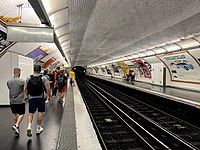Michel-Ange–Molitor (Paris Métro)
History
The station opened on 30 September 1913 when Line 8 was extended from Charles Michels (then called Beaugrenelle) to Porte d'Auteuil. Line 9's platforms opened on 8 November 1922 with the opening of the initial section of the line from Trocadéro to Exelmans. On 27 July 1937, the section of line 8 between La Motte-Picquet–Grenelle and Porte d'Auteuil, including Michel-Ange–Molitor was transferred to line 10 during the reconfiguration of lines 8, 10, and the old line 14. However, service between Porte d'Auteuil and Jussieu was not provided until two days later, on July 29 , with service initially limited to La Motte-Picquet-Grenelle.
As part of the "Renouveau du métro" programme by the RATP, the station's corridors was renovated and modernised on 27 July 2010.
In 2019, the station was used by 2,247,014 passengers, making it the 231st busiest of the Métro network out of 302 stations.
In 2020, the station was used by 1,180,095 passengers amidst the COVID-19 pandemic, making it the 222nd busiest of the Métro network out of 305 stations.
In 2021, the station was used by 1,420,552 passengers, making it the 241st busiest of the Métro network out of 305 stations.
Passenger services
Access
The station has a single access at rue Molitor and has a rare Val d'Osne totem.
Station layout
| Street Level | ||
| B1 | Mezzanine | |
| Line 10 platform | Eastbound | No regular service (No service northbound: Porte d'Auteuil) |
| Island platform, doors will open on the left | ||
| Eastbound | (No service westbound: Boulogne–Jean Jaurès) | |
| Line 9 platforms | Side platform, doors will open on the right | |
| Westbound | ← | |
| Eastbound | | |
| Side platform, doors will open on the right | ||
Platforms
The Line 9 station has a standard configuration with two tracks surrounded by two side platforms, and the vault is elliptical. The decoration is in the style used for most metro stations. The lighting canopies are white and rounded in the Gaudin style of the metro revival of the 2000s, and the bevelled white ceramic tiles cover the walls, the vault, and the tunnel exits. The advertising frames are made of honey-coloured earthenware with plant motifs and the name of the station is also incorporated into the wall tiles, in the interwar decorative style of the original CMP. The Motte style seats are blue in colour.
Line 10 has a particular configuration. Due to its location on the southern section of the Auteuil loop, it has two tracks framing an island platform, also of a classic length of seventy-five meters, which is only served in the direction of Gare d'Austerlitz, all under an elliptical vault. The track located to the north is used by the rare trains coming from Porte d'Auteuil (including the first daily service as well as the additional traffic at the end of the demonstrations at the Parc des Princes), the southern one being dedicated to the usual traffic of the line coming from Boulogne - Pont de Saint-Cloud. The decoration is a variant of the style used for most metro stations: traditional bevelled white ceramic tiles cover the vault, walls, and tunnel exits, while lighting is provided by a suspended tube band. The advertising frames are metal, and the name of the station is inscribed on enamelled plaques, in capital letters on the walls, and in Parisine font on the island platform. The Akiko style seats are burgundy in colour.
This decoration is almost identical to that of the neighbouring station of line 10, Michel-Ange - Auteuil, located on the other section of the loop.
Other connections
The station is also served by line 62 (only in the direction of Porte de France) of the RATP bus network.
Gallery
-
Line 9's platforms
-
Other view of line 10's platform
-
Access
References
- ^ "rue Molitor". v2asp.paris.fr (in French). Archived from the original on 3 March 2016. Retrieved 11 October 2022.
- ^ "Le Renouveau du Métro". www.symbioz.net (in French). Archived from the original on 14 October 2007. Retrieved 11 October 2022.
- ^ "Trafic annuel entrant par station du réseau ferré 2019". dataratp2.opendatasoft.com (in French). Archived from the original on 21 January 2022. Retrieved 11 October 2022.
- ^ "Trafic annuel entrant par station du réseau ferré 2020". data.ratp.fr (in French). Archived from the original on 21 January 2022. Retrieved 11 October 2022.
- ^ "Trafic annuel entrant par station du réseau ferré 2021". data.ratp.fr (in French). Archived from the original on 6 April 2023. Retrieved 11 October 2022.


